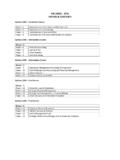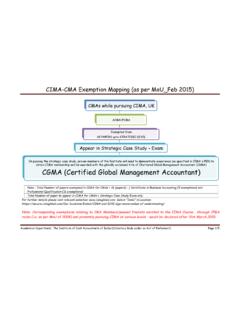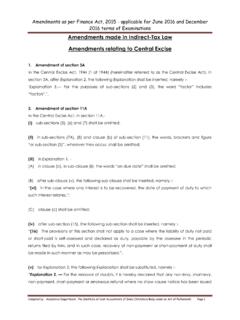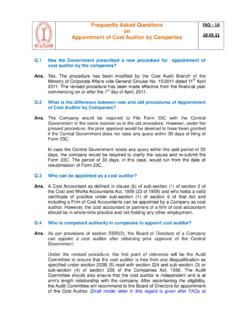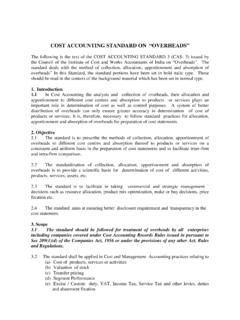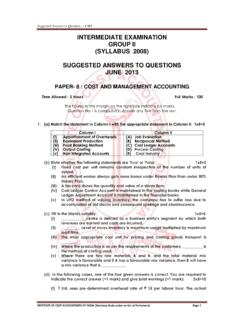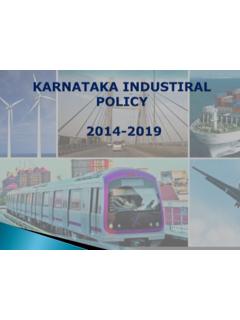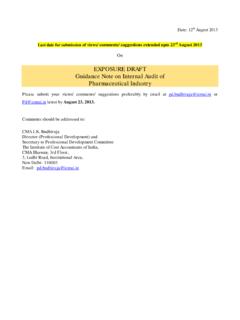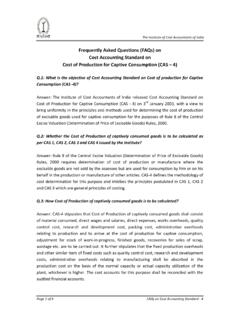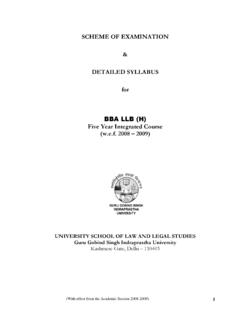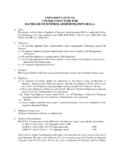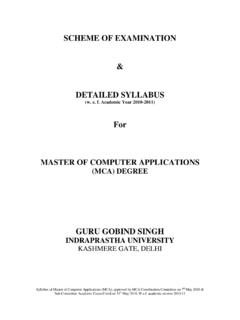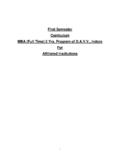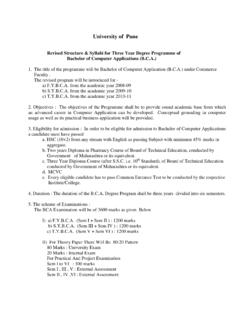Transcription of Paper 1 – Fundamentals of Organization and Management ...
1 Paper 1 Fundamentals of Organization and Management ( syllabus 2008 ) The Institute of Cost Accountants of India (Statutory Body under an Act of Parliament) Page 1 MULTIPLE CHOICE QUESTIONS 1. Who is a person who advanced early scientific Management principles? (a) Weber (b) Taylor (c) Vest (d) Fayol 2. A reporting relationship in which an employee receives orders from, and reports to, only one supervisor is known as: (a) Line of authority. (b) Centralization. (c) Unity of direction. (d) Unity of command. 3. Which worked on administrative Management theory: I. Fayol II. Parker III. Weber (a) I and III (b) II and III (c) none of these worked on administrative Management theory (d) I, II, and III 4. _____ is the study of how to create an organizational structure that leads to high efficiency and effectiveness. (a) Scientific Management (b) Job specialization (c) Administrative Management (d) Allocation Management 5.
2 _____ is the singleness of purpose that makes possible the creation of one plan of action to guide managers in resource allocations. (a) Unity of direction (b) Unity of command (c) Unity of authority (d) Unity of resources 6. Which is an organizational - environmental theory? I. The open-systems view II. Contingency theory III. The Theory of Bureaucracy IV. Theory Z (a) I and II (b) I, III, and IV (c) II, III, and IV (d) I, II, and III 7. Theory __ is based on positive assumptions about workers. (a) Z (b) X (c) Y (d) C 8. The _____ theory states a manager's choice of organizational structures and control systems depends on characteristics of the external environment. (a) Mechanistic (b) Management science (c) Organic (d) Contingency Paper 1 Fundamentals of Organization and Management ( syllabus 2008 ) The Institute of Cost Accountants of India (Statutory Body under an Act of Parliament) Page 2 9.
3 Which is not one of Fayol's principles: (a) Authority and responsibility (b) Line of authority (c) Globalization (d) Unity of command 10. Which is not a Management science theory: (a) Operations Management (b) TQM (c) MIS (d) None of these 11. Theory __ states that the average employee is lazy and will try to do as little as possible. (a) X (b) Y (c) Z (d) None 12. In recent history, workers have felt that they should be empowered in the workplace. This is an example of (a) social influences (b) political influences (c) technological influences (d) global influences 13. Scientific Management , administrative Management , and bureaucratic Management belong to the Management viewpoint known as the (a) classical perspective (b) behavioral perspective (c) quantitative perspective (d) systems perspective 14. The theorist that advocated standard methodology for doing a task and suggested that workers were motivated by pay according to output (piecework) is (a) Elton Mayo (b) Max Weber (c) Frederick Taylor (d) Henri Fayol 15.
4 As a Theory Y manager, you believe that your employees (a) dislike work and will avoid it if possible. (b) need a hierarchy of authority and lots of rules and regulations. (c) should be trained to standard methodology in all their tasks. (d) are self-motivated and self-directed toward achieving organizational goals. 16. What does the case, Scientific Management in action illustrate? (a) Scientific Management theory is an outdated Management theory. (b) Managers should apply classical Management theory to their everyday work if they want to be more effective. (c) A traditional approach to Management can be successfully applied to the problems of a modern organisation. (d) Quality usually suffers as productivity increases. 17. According to Frederick Taylor, who was to blame for the inefficiency in organisations? (a) The unions. (b) The managers.
5 (c) The organisation as a whole. (d) The workers 18. Which of these was not an integral part of scientific Management ? (a) Differential pay rates. (b) Worker control of production. Paper 1 Fundamentals of Organization and Management ( syllabus 2008 ) The Institute of Cost Accountants of India (Statutory Body under an Act of Parliament) Page 3 (c) Systematic selection of workers. (d) Work specialisation 19. Which of the following is not a valid criticism of scientific Management theory? (a) Increases in pay for workers were not proportional to increases in productivity. (b) Worker discretion over the execution of the task was reduced. (c) Jobs became too complex for workers to handle. (d) Fear of redundancy was increased. 20. Which of the following is not a fundamental characteristics of Bureaucratic Management ? (a) Specialisation of labour (b) Well defined hierarchy (c) Striving to be a first-class worker (d) Formal rules and regulations.
6 21. Which of these statements concerning Weber s concept of Bureaucracy is not correct? (a) It is based on rules and procedures rather than personal preference and judgement. (b) It is still a relevant concept in today s organisation. (c) It has acquired a negative reputation for inefficiency and rigidity. (d) It rejects rational approaches to managing organizations 22. Which of the following was an early key Management idea, pre-dating the work of Frederick Taylor and Max Weber? (a) Differential pay rates. (b) Rule-by-the-office. (c) Work specialisation. (d) Classical Management theory. 23. Which of the following was the key aim of scientific Management ? (a) To increase worker control of production. (b) To increase productivity. (c) To decrease absenteeism. (d) To develop time-and-motion studies. 24. Which of the following is NOT a key concept associated with scientific Management ?
7 (a) One best way. (b) Formalisation. (c) Time-and-motion studies. (d) Systematic selection. 25. Contingency theory suggests which of the following as a limitation of classical Management theory? (a) Management approaches need to take into account the informal social life of workers at work. (b) Management approaches need to take into account complexity and instability in the environment. (c) Everything is contingent upon the workers in an organisation. (d) Management practices need to recognise stability in the environment. 26. Which of the following is NOT true of scientific Management ? (a) It gave rise to the modern operations research. (b) It raises questions as to how rewards from increased productivity should be distributed. (c) It is outdated as a theory as it cannot be applied to today s modern organisations. (d) Managers are chosen for their intellectual ability and rationality.
8 27. Which of the following does NOT describe a problem with scientific Management ? (a) Productivity increases may not be reflected in workers pay. (b) It is better suited to complex jobs. (c) Improvement is not necessarily maintainable. (d) It is better suited to simple jobs. 28. Scientific Management gave rise to which of the following modern disciplines? (a) Theory Y. (b) Behavioural science. (c) Socio-technical systems. Paper 1 Fundamentals of Organization and Management ( syllabus 2008 ) The Institute of Cost Accountants of India (Statutory Body under an Act of Parliament) Page 4 (d) Operations research. 29. Which of the following men s writings are associated with bureaucracy? (a) Max Weber. (b) Henri Fayol.
9 (c) Frederick Taylor. (d) Douglas McGregor. 30. According to Fayol s 14 principles of Management , esprit de corps refers to which of the following? (a) Being treated fairly and kindly. (b) Spirit of the corporation. (c) Team work and harmony. (d) Spirit of work. 31. Which of the following images best captures how classical Management views the organisation? (a) As an organism. (b) As a human being. (c) As a machine. (d) As a wheel in an engine. 32. Which of the following is the odd one out ? (a) Management science. (b) Management accounting. (c) Operations Management . (d) Systems Management . 33. In general, Theory Y and Theory X belong to which of the following perspectives? (a) Socio-political.
10 (b) Bureaucratic. (c) Cultural. (d) None of these. 34. Which of the following is NOT part of the mix of behavioural sciences informing organisation behaviours? (a) Social psychology. (b) Organisational theory. (c) Systems theory. (d) Psychology. 35. The behavioural science approaches add which of the following emphases to Management ? (a) The study of people who satisfy social needs at work and how informal as well as formal organisation affects behaviour. (b) Management as a science and developing techniques to control behaviour. (c) The scientific study of human behaviour and developing behavioural techniques. (d) None of these. 36. Systems theory takes into account which of the following? (a) The whole system of anything. (b) Every system involving humans.
